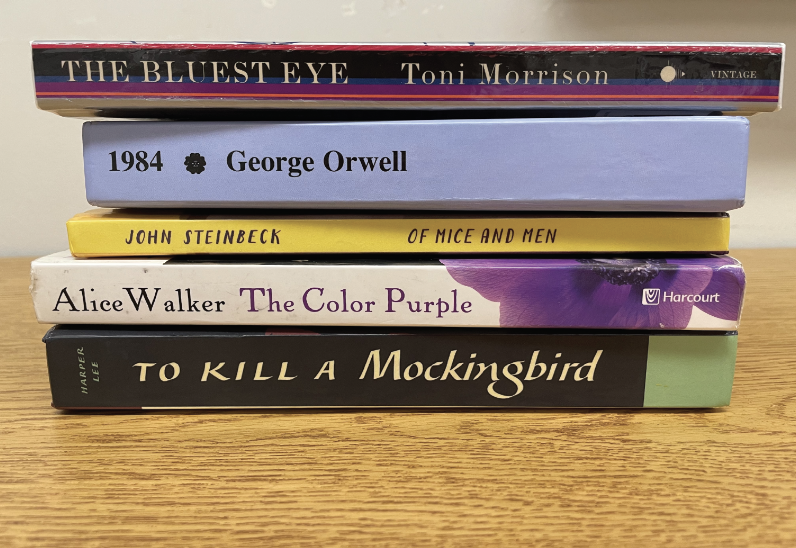Planks On Our Windows And Doors
Photo provided by Sophie Spicuzza.
Books that have been called controversial. From bottom to top: “To Kill A Mockingbird” by Harper Lee, “The Color Purple” by Alice Walker, “Of Mice And Men” by John Steinbeck, “1984” by George Orwell and “The Bluest Eye” by Toni Morrison.
October 19, 2022
Angie Watson gets emotional while talking about the new state law restricting book access.
“Representation is very important to our kids. They need to be able to see windows and mirrors, so windows into other worlds that they never knew were out there in mirrors of themselves and see it reflecting themselves and talking about it,” Watson, PCH Librarian, said.
The law, SB775, is a law originally aimed to deal with sexual harassment; however, once in committee a section was added to remove “sexually explicit” visualizations from being in school libraries.
It is important to note that this section is part of a bigger law. It is only this section that deals with educators, more specifically the sexually explicit material found in schools.
In short, SB775, Section 573.550 states that, “a person commits the offense of providing explicit sexual material to a student if such person is affiliated with a public or private elementary or secondary school in an official capacity”. And, knowing of its content and chapter, such person provides, assigns, supplies, distributes, loans, or coerces acceptance of or the approval of the providing of explicit sexual material to a student or possesses with the purpose of providing, assigning, supplying, distributing, loaning, or coercing acceptance of the approval of the providing of explicit sexual material to a student.” However exceptions exist if a work has, “serious artistic significance, or works of anthropological significance, or materials used in science courses, including but not limited to materials used in biology, anatomy, physiology, and sexual education classes…”
In layman’s terms, if a teacher, librarian, presenter invited to the school, administrator, teacher’s assistant, etc gives student explicit material that falls within the Bill they are subject to a fine of $2,000 and jail time.
Proponents of the law say that this is to protect students from dangerous material in school. State Senator Rick Brattin, who wrote the section on explicit visualizations in school, released a statement after the bill’s passing.
“In schools all across the country, we’ve seen this disgusting and inappropriate content making its way into our classrooms,” Sen. Brattin said. “Instead of recognizing this as the threat it is, some schools are actually fighting parents to protect this filth. The last place our children should be seeing pornography is in our schools.”
This law mainly restricted graphic novels, including memoirs and stories encompassing the LGBTQIA+ and stories of someone finding their identity. So far, six books have been banned from schools including titles such as: “Maus” and “Gender Queer” by Art Spiegelman and Maia Kobabe respectively. While this bill may appear to not affect teachers if they just comply with the law, it actually has bigger repercussions than just banning some books.
Central High Librarians Liz Lyons and Angie Watson expressed their concerns about the new law, especially how vulnerable educators become amidst this change. Being liable for material students consume makes educators have to rethink each book they lend out. The PCH librarians say they work hard to ensure each child feels represented throughout the library, and this new law takes away that dedication. Their efforts to make children feel included can land them in jail with a hefty fine, all for loaning out a simple book.
“A lot of our kids feel really comfortable in our library. They may not feel comfortable in the rest of the building, but I feel like Ms. Lyons and I have really tried very hard to make this a library that is a loving and accepting place for all different kinds of students,” said Watson.
While working in the library for many years they have been able to connect with a vast number of students from different races, religions, genders, and walks of life. They understand the difficulty that comes with feeling represented and want people to understand that. They know that people will not always find books in a library that they are fond of, but that material belongs there.
“If you don’t see something that offends you, in a library like that, librarians do not do a good job, because I mean, like, the library isn’t just for you. It’s for everybody. And that’s what libraries have always been for,” Lyons said. Both Lyons and Watson articulate that while the new law is not going away, they will continue to advocate for each and every one of their students. Saying they will work to provide windows and doors for them and continue to be an inclusive space for all students to feel at home.
This bill is just the start of books being banned throughout schools. If books are the start, what comes next? If educators are being silenced over books, in what other ways will they continue to be silenced? As more and more complaints arise regarding the type of material being provided to students, will more books continue to be banned?
To read more about the law, follow this link: https://www.senate.mo.gov/22info/BTS_Web/Bill.aspx?SessionType=R&BillID=71259740#:~:text=STUDENT%20(Section%20573.550)-,This%20act%20provides%20that%20a%20person%20commits%20the%20offense%20of,supplies%2C%20distributes%2C%20loans%2C%20or


